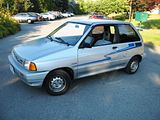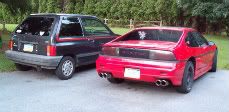This is what I do in my spare time, lol....... I made this a few years ago when I was driving my 2005 Echo Hatchback
MPG =
378 - 0.000033 Aggressive cubed + 0.00430 Aggressive squared
- 0.158 Aggressive % - 0.000401 A/C squared
+ 1.39 Cutting engine at lights - 0.000882 city X aggressive
- 0.647 Fills since oil change + 0.0372 fills since oil change squared
- 0.000063 pounds of gas cubed + 0.0335 pounds of gas squared
- 5.85 pounds of gas on average
I have the variables:
% Aggressive driving in a given tank(then squared and cubed of variable)
% A/C use in a given tank (then squared too)
Tanks of gas that I turned off the car at lights
# of fills since last oil change (average fill is 400 miles)
pounds of gas in my tank on average in a given tank (squared and cubed)
I also have a X product in there as well (city X aggressive) which takes my %city driving and multiplies the % of time in that same tank that I drove aggressively.
I had 23 data points (23 fills over the course of the past few months).
This regression model gives a R-squared value of 92.9%. (which means that 92.9% of the variability in my gas mileage is accounted for in this equation.)
Oh and the reason I added the pounds of gas in the tank is due to the debate over whether getting gas too often (aka when you still have half a tank) will hinder your mileage. And it does indeed seem to.
(All percentage values were multiplied by 100)
As for aggressive driving, I defined it as the percent of the miles driven that I
a) would speed (to a maximum of 10 mph above the limit)
b) purposely accelerate and brake needlessly (aka in the city in between lights)
c) drive in a lower gear (aka higher revs for same speed)
And this percentage may be off by 5% or so either way, but as per the large "n" normality in the data's variation would indeed even out.,
MPG =
378 - 0.000033 Aggressive cubed + 0.00430 Aggressive squared
- 0.158 Aggressive % - 0.000401 A/C squared
+ 1.39 Cutting engine at lights - 0.000882 city X aggressive
- 0.647 Fills since oil change + 0.0372 fills since oil change squared
- 0.000063 pounds of gas cubed + 0.0335 pounds of gas squared
- 5.85 pounds of gas on average
I have the variables:
% Aggressive driving in a given tank(then squared and cubed of variable)
% A/C use in a given tank (then squared too)
Tanks of gas that I turned off the car at lights
# of fills since last oil change (average fill is 400 miles)
pounds of gas in my tank on average in a given tank (squared and cubed)
I also have a X product in there as well (city X aggressive) which takes my %city driving and multiplies the % of time in that same tank that I drove aggressively.
I had 23 data points (23 fills over the course of the past few months).
This regression model gives a R-squared value of 92.9%. (which means that 92.9% of the variability in my gas mileage is accounted for in this equation.)
Oh and the reason I added the pounds of gas in the tank is due to the debate over whether getting gas too often (aka when you still have half a tank) will hinder your mileage. And it does indeed seem to.
(All percentage values were multiplied by 100)
As for aggressive driving, I defined it as the percent of the miles driven that I
a) would speed (to a maximum of 10 mph above the limit)
b) purposely accelerate and brake needlessly (aka in the city in between lights)
c) drive in a lower gear (aka higher revs for same speed)
And this percentage may be off by 5% or so either way, but as per the large "n" normality in the data's variation would indeed even out.,







Comment